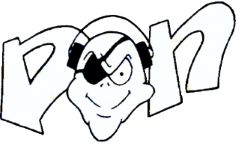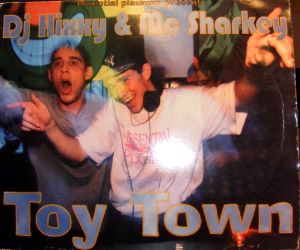Related Research Articles

Drum and bass is a genre of electronic dance music characterised by fast breakbeats with heavy bass and sub-bass lines, samples, and synthesizers. The genre grew out of the UK's jungle scene in the 1990s.
Breakbeat hardcore is a music genre that spawned from the UK rave scene during the early 1990s. It combines four-on-the-floor rhythms with breakbeats usually sampled from hip hop. In addition to the inclusion of breakbeats, the genre also features shuffled drum machine patterns, hoover, and other noises originating from new beat and Belgian techno, sounds from acid house and bleep techno, and often upbeat house piano riffs and vocals.

A rave is a dance party at a warehouse, club, or other public or private venue, typically featuring performances by DJs playing electronic dance music. The style is most associated with the early 1990s dance music scene when DJs played at illegal events in musical styles dominated by electronic dance music from a wide range of sub-genres, including drum and bass, dubstep, trap, break, happy hardcore, trance, techno, hardcore, house, and alternative dance. Occasionally live musicians have been known to perform at raves, in addition to other types of performance artists such as go-go dancers and fire dancers. The music is amplified with a large, powerful sound reinforcement system, typically with large subwoofers to produce a deep bass sound. The music is often accompanied by laser light shows, projected coloured images, visual effects and fog machines.
Jungle is a genre of electronic music that developed out of the UK rave scene and sound system culture in the 1990s. Emerging from breakbeat hardcore, the style is characterised by rapid breakbeats, heavily syncopated percussive loops, samples, and synthesised effects, combined with the deep basslines, melodies, and vocal samples found in dub, reggae and dancehall, as well as hip hop and funk. Many producers frequently sampled the "Amen break" or other breakbeats from funk and jazz recordings. Jungle was a direct precursor to the drum and bass genre which emerged in the mid-1990s.
Happy hardcore, also known as 4-beat or happycore, is a subgenre of hardcore dance music or "hard dance". It emerged both from the UK breakbeat hardcore rave scene, and Belgian, German and Dutch hardcore techno scenes in the early 1990s. The thing that makes happy hardcore stand apart from happy gabba, is that happy hardcore tends to have breakbeats running alongside the 4/4 kick drum.
Bouncy techno is a hardcore dance music rave style that developed in the early 1990s from Scotland and Northern England. Described as an accessible gabber-like form, it was popularised by Scottish DJ and music producer Scott Brown under numerous aliases.

Kevin Ford, better known as DJ Hype, is a British jungle and drum and bass producer and DJ.
Pirate radio in the United Kingdom has been a popular and enduring radio medium since the 1960s, despite expansions in licensed broadcasting, and the advent of both digital radio and internet radio. Although it peaked throughout the 1960s and again during the 1980s/1990s, it remains in existence today. Having moved from transmitting from ships in the sea to tower blocks across UK towns and cities, in 2009 the UK broadcasting regulator Ofcom estimated more than 150 pirate radio stations were still operating.
Matthew Nelson, better known as DJ Slipmatt, is a British electronic music producer and DJ. He was one half of breakbeat hardcore group SL2, who had a 1992 UK hit with "On a Ragga Tip".

Luna-C is a British DJ and record producer, known for his work in breakbeat hardcore music. He was a member of the group Smart E's in 1992, who scored a No. 2 hit on the UK Singles Chart with "Sesame's Treet" which samples the Sesame Street theme song. He founded Kniteforce Records in 1992, for which he produced tracks and remixes under various aliases. The label was sold in 1997 but resurrected as Kniteforce Again (KFA) in 2001.
Drum and bass is an electronic music genre that originated in the UK rave scene having developed from breakbeat hardcore. The genre would go on to become one of the most popular genres of electronic dance music, becoming international and spawning multiple different derivatives and subgenres.
Darren James Mew, better known as Darren Styles, is an English record producer, DJ, singer and songwriter from Colchester, Essex, England. Originally a member of the breakbeat hardcore group DJ Force & the Evolution, Styles found success during the 1990s as one half of Force & Styles. The duo were pioneers of happy hardcore and wrote several well-known songs such as "Heart of Gold", "Pretty Green Eyes" and "Paradise & Dreams".

Don FM was a 1990s London pirate radio station, influential in the development of breakbeat hardcore, jungle and drum and bass music. It was the first jungle pirate station granted a temporary legal license.
Dowster or DJ Dowster, also known as David Thomas,, is a Welsh record producer, singer-songwriter and disc jockey from Cwmbran in South Wales. David has been involved in the rave scene since 1998 and his love of the music lead him to begin his DJ career in In 2001, Dowster was signed to Raver Baby Records by its owner DJ Hixxy to become part of the original Raver Baby Collective. This collective, known at the time as the RBC, included some of the UK Hardcore scene's leading DJs and MCs – Hixxy, Breeze, Darren Styles, UFO, MC Storm and MC Whizzkid. In addition to his DJ bookings and single releases within this period, Dowster's solo and collaborative studio projects can be found on certain volumes of the highly successful Bonkers series as well as other leading names in UK hardcore compilation albums. Three of his most popular tracks were "Starlight", "Steps Ahead" and "Here We Go".
Deekline is a British producer and DJ of breakbeat, breakstep, drum and bass and garage music. He is the innovator of breakstep music which is bass-heavy, breakbeat-infused 2-step, first characterised in his 1999 hit "I Don't Smoke", which reached No. 11 on the UK charts. He is the owner of Rat Records, which has released material of such artists as DJ Fresh, Jack Beats, Stanton Warriors, Wiley, Skinny Man, Rennie Pilgrem, House Breakers and Freq Nasty. Deekline has also had notable collaborations with British electronic music producers Ed Solo and Wizard. In 2011, he opened up his online clothing store, Bass Boutique.

Happy 2b Hardcore is a DJ mix album by Canadian DJ Anabolic Frolic. It was released in 1997 on American breakbeat label Moonshine Music and is the first series in Frolic's Happy 2b Hardcore series of DJ mix albums, documenting the emergence of happy hardcore music in the United Kingdom and Europe. The series itself is a spin-off of Moonshine's Speed Limit 140 BPM+ series of fast-tempo dance music compilations. The album was conceived to introduce American audiences to happy hardcore, and contains sixteen of the genre's anthems which carry many of happy hardcore's defining characteristics, such as fast tempo, frantic breakbeats, major key tonality, off-kilter, quirky keyboard effects and "semi-melodies."
London Underground FM was a mid-1990s to early-2000s pirate radio station in London.

Eruption Radio is a London-based radio station that broadcasts online and on DAB playing house, breakbeat and happy hardcore, and drum and bass as well as other genres. Eruption Radio originally started life in February 1993 as Eruption FM, a pirate radio station broadcasting from Waltham Forest, East London, broadcasting until February 2012.
Randall McNeil, better known as "DJ Randall", is a British Jungle and Drum and bass DJ and record producer.

"Toy Town" is a happy hardcore track by British duo DJ Hixxy and MC Sharkey. Released in 1995, the single was a hit in the UK clubbing scene, peaked at number 24 in the UK dance singles chart, and had a pivotal impact in the UK rave music scene with a move away from breakbeat towards the newer happy hardcore "cheesy" sound.
References
- ↑ Angela Lewis (6 September 1994). "Angela Lewis on pop". The Independent. Archived from the original on 11 June 2015.
- ↑ "Gone To A Rave: High On A Happy Vibe - The Rise And Fall Of Hardcore". Ransom Note. 29 January 2015. Archived from the original on 20 August 2016.
- ↑ "Dream FM (1994–1997) Londonpirates.co.uk". LondonPirates.co.uk. 27 February 2007. Archived from the original on 3 April 2013.
- 1 2 "DJ Spinback Profile". DJSpinback.com. 10 July 2010. Archived from the original on 18 July 2011.
- ↑ "Labrynth Saturdays January 1995 - Dream FM on Sat 28th Jan 1995". Phatmedia. 28 January 1995.
- ↑ "Slammin Vinyl & Dream FM - Bagleys, Kings Cross, London N1 - Friday 17 May 1996". Phatmedia. 17 May 1996.
- ↑ "Slammin Vinyl & Dream FM - Bagleys, Kings Cross, London N1 - Friday 15 March 1996". Phatmedia. 15 March 1996.
- ↑ "Dream FM Proudly Presents: Friday 13th The Allnighter Returns - Adrenalin Village, Chelsea Bridge, London SW8 - Friday 13 September 1996". Phatmedia. 13 September 1996.
- ↑ "Dream FM 2nd Birthday - Gardening Club II, Piccadilly, London W1 - 17 November 1995". Phatmedia. 17 November 1995.
- ↑ Dan Hancox (8 September 2011). "Pirate radio rave tapes: 'You can't Google this stuff'". The Guardian. Archived from the original on 24 August 2013.
- ↑ "Radio Renegades – UK London Pirate Radio Documentary". Rave-archive.com. 19 March 2013.
- ↑ "Dream FM - Friday 7th March 1997 - Linford Film Studios (London)". Phatmedia. 7 March 1997.